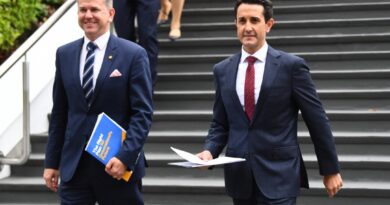Germany’s Chancellor advocates for fair playing field on EU market in talks with China
According to the chancellor, unilateral economic policy decisions in China are posing significant structural challenges for companies in Germany and Europe.
German Chancellor Olaf Scholz held discussions regarding trade and foreign policy with Chinese Communist Party (CCP) leader Xi Jinping and Premier Li Qiang in Beijing on April 16.
Scholz emphasized the importance of establishing processes to address concerns about Chinese state subsidies affecting trade and proposed utilizing the World Trade Organization for this purpose during his meeting with Xi.
He stressed the necessity of all subsidies being registered with the World Trade Organization to ensure transparency and fair competition.
Scholz urged for improved market access and a level playing field for German companies during his talks with Xi.
Xi, in response, highlighted that German-Chinese collaboration represents an opportunity rather than a risk.
Scholz’s visit to China, Germany’s largest trading partner, comes as the European Union seeks to reduce strategic dependencies on Chinese goods and investigate potential dumping of subsidized goods in their market.
Xi defended against allegations from EU Commission President Ursula von der Leyen regarding China’s overproduction of green tech, such as electric vehicles, being unfairly supported by extensive state subsidies.
While cautious about distancing from China, Scholz emphasized fair competition between the two countries to ensure a level playing field during his visit to Shanghai.
During his meeting with Li, the German chancellor pressed for improved business conditions in China, including equal market access, protection of intellectual property, and a reliable legal system for German companies.
Scholz expressed concern about the challenges created by China’s unilateral economic policies for German and European companies.
His trip marked the second visit to China since assuming office in 2021 and was the first visit following the presentation of Germany’s China strategy last year.
Auto Industry
Accompanied by senior German executives, Scholz visited China, underscoring the significance of the Chinese market for Europe’s largest economy.
During the visit, Scholz also toured German auto supplier Bosch’s hydrogen fuel cell plant in Chongqing.
Mercedes-Benz Chairman Ola Kallenius and BMW CEO Oliver Zipse emphasized the importance of not withdrawing from the Chinese market but instead strengthening their position.
Xi mentioned that China and Germany have vast potential for cooperation in various sectors, including traditional fields like machinery manufacturing and emerging sectors such as green transformation and digital artificial intelligence.
An encouraging outcome of Scholz’s visit was China lifting restrictions on imports of beef and apples from Germany.
EU Probes into Chinese Subsidies
The European Commission President highlighted the need for diplomatic and economic de-risking with China instead of decoupling to address economic imbalances and distortions created by China’s state-controlled economic system.
China was the third-largest partner for EU exports and the largest partner for imports of goods, highlighting the significant trade relationship between the two entities.
Efforts are underway to investigate Chinese subsidies in various sectors, including electric cars, wind turbines, solar panels, and trains, to determine their impact on fair competition and market dynamics.
The EU is considering measures such as tariffs to protect its producers against cheap imports from China in critical sectors like electric vehicles.
The EU’s increased scrutiny of Chinese subsidies is driven by concerns about unfair advantages in the market and potential risks to security and competitiveness.
No Decoupling; De-risking Difficult
Scholz emphasized the importance of not decoupling from China but rather addressing structural issues and enhancing cooperation quality during his visit.
Both sides expressed opposition to decoupling and emphasized collaboration in response to global challenges to promote stability and certainty.
Despite the positive outcomes of the visit, concerns remain about issues like human rights and cybersecurity that could impact bilateral relations in the future.
German firms continued to invest significantly in China, reflecting the importance of the Chinese market for German businesses.
The continued expansion of German operations in China challenges the notion of de-risking and underscores the importance of the Chinese market for Germany’s economic interests.
The Center for Eastern Studies noted the increasing trade volume with China and major firms’ willingness to expand operations in China as factors undermining the de-risking strategy adopted by Germany.
Shawn Lin, Michael Zhuang, Reuters, and The Associated Press contributed to this report.



